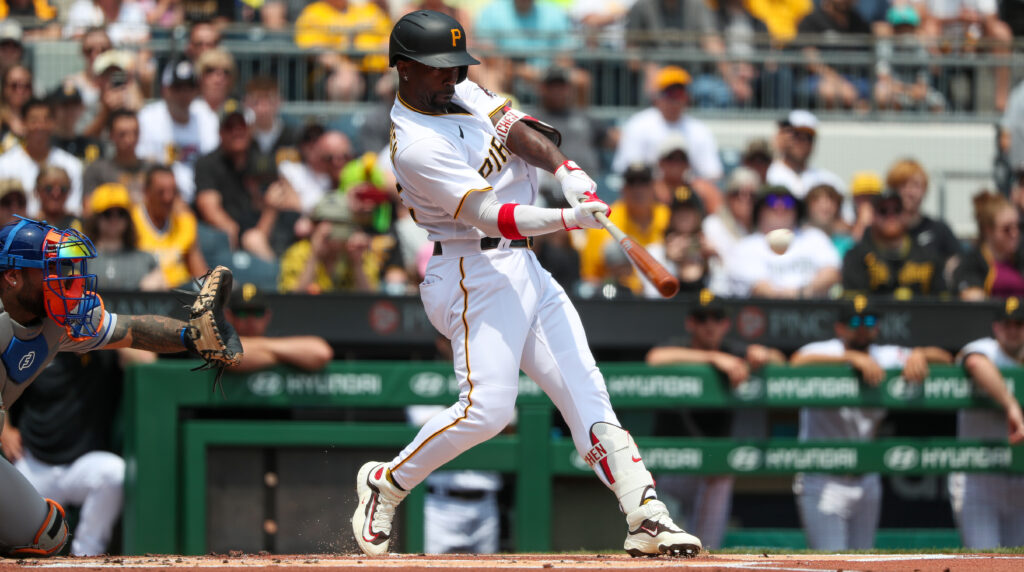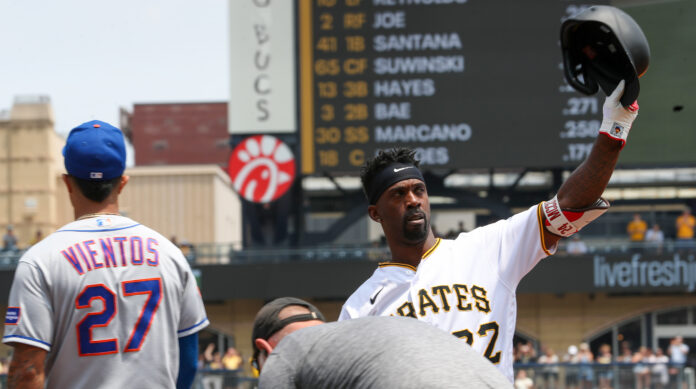Fewer than 300 players have recorded 2,000 hits in the majors.
Andrew McCutchen is now one of those select few. In his first at-bat on Sunday against the Mets, McCutchen ripped a line drive to left field, picking up hit number 2,000 on his career.

In a league that has seen a bit more than 20,000 Major Leaguers total, McCutchen has established himself in his career as being among the 1% of the 1% — to borrow his own phrasing, which I don’t think he would use for himself.
Last month, I had a chance to talk with McCutchen one-on-one about his career, which began in Pittsburgh 14 years and one week ago with his first hit in his first big league at-bat. McCutchen is now in a veteran leadership role for the Pirates, with the stated desire to remain in Pittsburgh and play beyond this year.
Below is the transcript of the ten minute conversation between myself and McCutchen last month.
Tim Williams: You came up as a prospect here and now you’re kind of on the other side where they’ve got a new wave of guys coming up in here, you’re the veteran leader. I’ve always heard as you get older you become the player you needed when you were younger. Do you feel like you’re the player right now, in this clubhouse, you needed when you were younger?
Andrew McCutchen: No, because I think I had a good group of guys that were filling that role. When I came up, because all honestly, if I didn’t have that, I mean, I don’t think we would have been able to propel ourselves into having that strand of three years where we did well. There was always a good group of guys when I was around. We had a team full of veterans when I was a rookie. You know, it was basically all veterans on the team when I came up, you know what I mean? You go around the horn. Ryan Doumit was a catcher. We had multiple pitchers that were veterans. Adam Laroche. Freddy Sanchez at second. Jack Wilson, at short. It goes on and on. Craig Monroe in the outfield. Even Nyjer Morgan. Ryan Church. There were a lot of guys who had been around. They had some time. Yeah, so, I had a good group of guys, that could direct me and ended up helping me.
Tim Williams: What kind of stuff helped? Was it just getting into the flow of the major league lifestyle and routines?
Andrew McCutchen: It’s no different than having someone in your life that has been around a little longer, or a father figure, or just someone teaching you the ins and outs of what you need to learn, and the things that you need to know and do before you do them. Expectations. And it’s all those things that you only learn by being around it, and by people telling you. They taught me a lot of things that I didn’t have to necessarily find/figure out myself, go through it, and then learn from it. I was around the people that were able to say ‘This is your expectation, this is what you have to look forward to.’ The do’s, the don’ts, you know, and I learned it pretty fairly quickly over over my first couple, two, three years in the big leagues. It was really helpful.
Tim Williams: A lot of guys have adjustment periods, but from you didn’t really have much of an adjustment period. You came up and, just using WAR because that’s what I’ve got in my memory, I think it was like three and a half the first season, by year two or three it was above five. It seems like what you’re talking about, those lessons almost cut down the learning curve for you.
Andrew McCutchen: Yeah, you get a group of guys that can have a veteran presence… There’s veterans who care to help the younger guys, but being a younger guy, you got to be willing to be open for criticism, and for someone who’s been around longer than you would be willing to let your guard down and to listen. Not look at it like a seniority thing where someone’s trying to tell you what to do. But take it as like, this is a learning curve for me. You know, someone’s not running out a ball, and a veteran comes over to you and says run, every single time you’re out there. It’s not a sense of like, ‘He’s telling me what to do.’ There’s a bigger reason behind it. Being a younger guy, you have to make up in your mind and accepting ‘Is this making me better? Or is he just screaming at me because he feels like he can?’ So you know, there’s a difference. It’s a two way street with that. I was always eager to learn. I listened a lot. And I’m just thankful for the guys that were around when I was there.
Tim Williams: I feel like from the outside, covering prospects, even throughout the industry, there’s a disconnect about the mental game. You were drafted in the first round, you were a top prospect on all the lists every step of the way. So, there was this expectation around you that you fulfilled, but you made it look easy. And what you’re describing, the technical aspect wasn’t easy. From the outside it’s Andrew McCutchen: first rounder, top prospect, it’s inevitable that you would eventually be an MVP, but it seems like there was a lot to get to that point for you.
Andrew McCutchen: Yeah, I mean, anyone in the position that they’re in, there’s a lot that they have to go through. Everyone has their own story to get to where they are. And that’s not just in baseball. That’s in life in general. And, you know, one thing I feel like I’ve learned, things that I’ve seen over the years is that people who are able to stay around and have success, number one, their body holds up. But two, there’s a mental side of the game, that they are prepared. They don’t just let their ability speak for themselves. They work and work hard. And ultimately, they’re well respected. They respect others, and people respect them. I think that’s a recipe for, a person being around for as long as they want. I think you have to have a bit of all of those things and intangibles to be able to have a successful career. Your play is only gonna get you so far. But, if you can do it the right way, and you respect the game, and you respect others, then I think that’s the veteran part.
Tim Williams: One thing I’ve noticed, and you mentioned not just in baseball but across all performance across all things: When people hit that high level, like you had 2013 through 15, where it’s like, you’re the best at what you do, it doesn’t have to be in baseball, but it’s like you’re performing up here (holds hand over head). It seems like that’s a level that it’s really difficult to maintain. Like, it’s almost superhuman that you would routinely be a seven WAR player, or you’d be a .900 to 1.000. OPS guy. As far as the effort, concentration, the focus for every day for three years to perform at that level, what did that do to you?
Andrew McCutchen: You go about your business and you work hard and you play the game. The only difference between good and bad years is consistency. Plain and simple. There’s nothing else that you have to dive deeper into. How consistent were you as a hitter? How consistent were you with your preparation, with playing every single day, how’s your body hold up? You had to be consistent on a lot of areas, you know, and then if you’re able to do that, you’re gonna have good years. But that’s the difference. You gotta have the natural abilities, where you do things where it seems like only that person can do it. When you see Mike Trout, there’s only one Mike Trout. You see Aaron Judge and know what he does, there’s only one Aaron Judge. There’s only one Shohei [Ohtani]. So those guys are the 1% of the 1%. When they do things, you’re like ‘Man, that’s unreal.’ So there’s a natural ability there, but on top of that natural ability, there’s a sense of what they do and how they do it and how consistent they are. It’s just about being consistent. For those three years in that period, I was consistent. I was consistent with everything. And I was able to have those years that I had. That’s something that I chase, still to this day, is maintaining that consistency, because I know and I feel regardless of where I am, and regardless of how old I am, I know I can still be consistent. Maybe it’s not 2012 consistency, but I know it’s a consistency that can make me an above average player.
Tim Williams: You’re a DH now. Not being on the field, that probably helps you to stay fresh. Is that a different experience for you?
Andrew McCutchen: There’s still a learning curve for me, because I’m a guy who predicates the way that I play, I’m a guy who plays on the field. I play the outfield. That’s what I’m used to, thiat’s what I’ve done in my entire life. I also understand we have younger guys that are out there. And I know if I’m out there every day on my feet, that can make things inconsistent. It’s still a learning curve, and I’m still learning it. I had my first year last year where I was really, basically the DH. So here, you know, it’s roughly relatively the same thing. I’m still learning through it and trying to keep my body moving. Because, you know, it’s crazy, but, when you’re DH and you have games where you may not get on base, you may not run, it’s like ‘Well, I need to find time where I can run. I need to run.’ So now I’m on a treadmill and I’m running, you know, or I’m shagging more fly balls in the outfield just to keep my body moving.
Tim Williams: Between the games? Or do you stay active in the games?
Andrew McCutchen: Well, both. In games, you know, BP, just things like that, just to get myself moving, staying fluid, and not feel like I’m out of the game. Or I’m just halfway into the game. It’s a learning curve. And I’m still working as work in progress. But you know, it’s good for people like me who want to extend their career paths paths or mid 30s even into the 40s.
McCutchen has expressed the desire to play beyond this year, and to finish his career in Pittsburgh. Considering the performance so far, and the leadership he brings to the team, there’s no reason why the Pirates shouldn’t keep bringing him back for this role. Photo of McCutchen’s 2,000th hit celebration above by David Hague.



